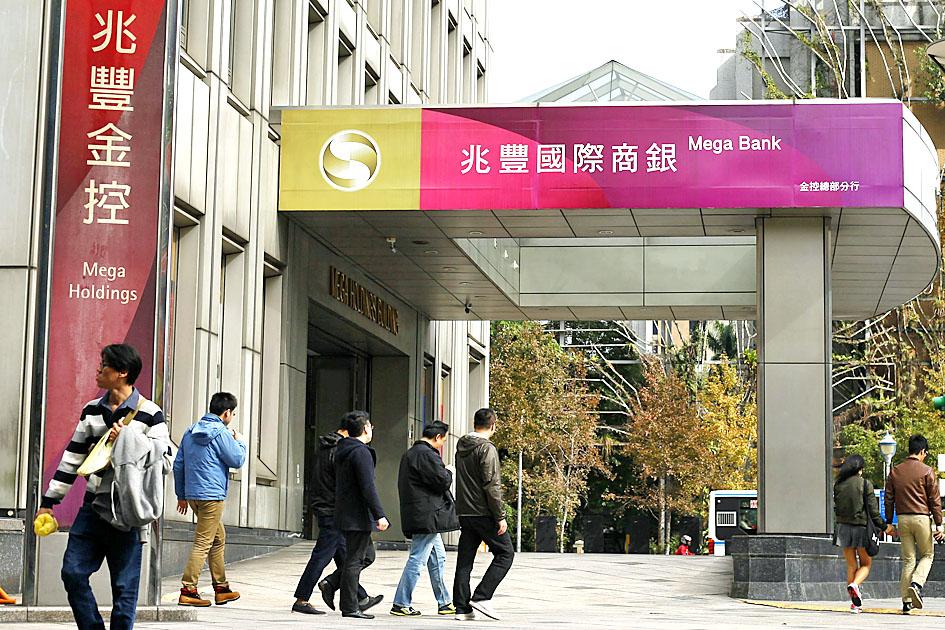State-run Mega International Commercial Bank (兆豐銀行), the main subsidiary of Mega Financial Holding Co (兆豐金控), yesterday said it aims to strengthen mortgage operations this year, as the business helps boost credit card customers and fund sales.
The lender’s mortgage operations last year spiked 64 percent year-on-year to NT$120 billion (US$4.24 billion), carrying its retail banking to second place among domestic peers, despite sharp competition, Mega Bank said.
Mega Bank attributed the achievement to its successful targeting of customers with real demand, namely first-time home buyers and those with relocation needs.

Photo: Ritchie B. Tongo, EPA-EFE
Mortgage borrowers tend to have long-term relationships with banks and have demonstrated a keen interest in credit card usage, mutual funds, foreign currencies and other financial products and services, Mega Bank said.
Mortgage customers accounted for NT$6.1 billion of fund sales last year, the highest in three years, while contributing NT$2.3 billion in credit card spending, the lender said, adding that 70 percent of mortgage customers own Mega Bank credit cards.
The central bank’s selective credit controls are favorable for the health of the mortgage market, as they require higher capital for property development and multiple home purchases, the lender said.
Mega Bank said it would beef up mortgage operations by increasing its number of clients aged 39 or younger, adding that first-time home buyers underpin this group with an average loan demand of NT$8 million.
The lender would support the government’s program to provide young home buyers with preferential interest rates and make its online services more user-friendly, it said.

To many, Tatu City on the outskirts of Nairobi looks like a success. The first city entirely built by a private company to be operational in east Africa, with about 25,000 people living and working there, it accounts for about two-thirds of all foreign investment in Kenya. Its low-tax status has attracted more than 100 businesses including Heineken, coffee brand Dormans, and the biggest call-center and cold-chain transport firms in the region. However, to some local politicians, Tatu City has looked more like a target for extortion. A parade of governors have demanded land worth millions of dollars in exchange

Hong Kong authorities ramped up sales of the local dollar as the greenback’s slide threatened the foreign-exchange peg. The Hong Kong Monetary Authority (HKMA) sold a record HK$60.5 billion (US$7.8 billion) of the city’s currency, according to an alert sent on its Bloomberg page yesterday in Asia, after it tested the upper end of its trading band. That added to the HK$56.1 billion of sales versus the greenback since Friday. The rapid intervention signals efforts from the city’s authorities to limit the local currency’s moves within its HK$7.75 to HK$7.85 per US dollar trading band. Heavy sales of the local dollar by

Taiwan Semiconductor Manufacturing Co’s (TSMC, 台積電) revenue jumped 48 percent last month, underscoring how electronics firms scrambled to acquire essential components before global tariffs took effect. The main chipmaker for Apple Inc and Nvidia Corp reported monthly sales of NT$349.6 billion (US$11.6 billion). That compares with the average analysts’ estimate for a 38 percent rise in second-quarter revenue. US President Donald Trump’s trade war is prompting economists to retool GDP forecasts worldwide, casting doubt over the outlook for everything from iPhone demand to computing and datacenter construction. However, TSMC — a barometer for global tech spending given its central role in the

The Financial Supervisory Commission (FSC) yesterday met with some of the nation’s largest insurance companies as a skyrocketing New Taiwan dollar piles pressure on their hundreds of billions of dollars in US bond investments. The commission has asked some life insurance firms, among the biggest Asian holders of US debt, to discuss how the rapidly strengthening NT dollar has impacted their operations, people familiar with the matter said. The meeting took place as the NT dollar jumped as much as 5 percent yesterday, its biggest intraday gain in more than three decades. The local currency surged as exporters rushed to